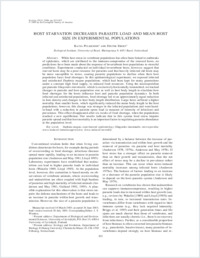Host starvation decreases parasite load and mean host size in experimental populations
- Pulkkinen, Katja Department of Biological and Environmental Sciences, University of Jyväskylä, Finland
- Ebert, Dieter Ecology and Evolution, Department of Biology, University of Fribourg, Switzerland
-
2004
Published in:
- Ecology. - 2004, vol. 85, p. 823-833
Daphnia magna
experimental epidemiology
Glugoides intestinalis
microsporidia
stress-induced immunosuppression
stress-induced mortality
English
While host stress in vertebrate populations has often been linked to outbreaks of epidemics, which are attributed to the immuno-compromise of the stressed hosts, no predictions have been made about the response of invertebrate host populations to stressful conditions. Experiments conducted on individual invertebrate hosts, however, suggest that starved hosts may be a poor resource for parasites and that heavily infected old hosts may be more susceptible to stress, causing parasite populations to decline when their host population faces food shortages. In this epidemiological experiment, we exposed infected and uninfected Daphnia magna populations, which had been kept for many generations under a constant high food supply, to reduced food resources. Using the microsporidian gut parasite Glugoides intestinalis, which is exclusively horizontally transmitted, we tracked changes in parasite and host population size as well as host body length to elucidate how food shortages for the hosts influence host and parasite population dynamics. In both infected and uninfected populations, food shortage led to an approximately equal reduction in host density and changes in host body length distribution. Large hosts suffered a higher mortality than smaller hosts, which significantly reduced the mean body length in the host populations; however, this change was stronger in the infected populations and went hand-in-hand with a reduction in parasite spore load (a measure of intensity of infection) and prevalence. This effect disappeared after six weeks of food shortage, when the populations reached a new equilibrium. Our results indicate that in this system food stress impairs parasite spread and that host mortality is an important factor in regulating parasite abundance at the population level.
- Faculty
- Faculté des sciences et de médecine
- Department
- Département de Biologie
- Language
-
- English
- Classification
- Ecology and biodeversity
- License
-
License undefined
- Identifiers
-
- RERO DOC 4150
- DOI 10.1890/03-0185
- Persistent URL
- https://folia.unifr.ch/unifr/documents/299646
Statistics
Document views: 218
File downloads:
- Texte intégral: 351
